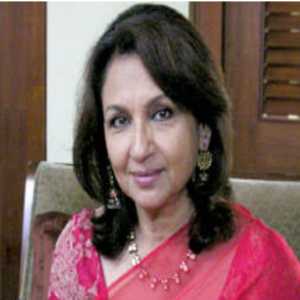Sharmila Tagore (also known as Begum Ayesha Sultana; born 8 December 1944) is an Indian actress, primarily known for her work in Hindi and Bengali cinema, Tagore is the recipient of two National Film Awards, a Filmfare Award, and the Filmfare Lifetime Achievement Award for her contributions to Hindi cinema. In 2013, the Government of India, honoured her with Padma Bhushan, India's third highest civilian honour for her contributions to the Indian culture through performing arts.
Born into the prominent Tagore family, one of the leading families of Calcutta and a key influence during the Bengali Renaissance, Tagore made her acting debut at age 14 with Satyajit Ray's acclaimed Bengali drama The World of Apu (1959). She went on to collaborate with Ray on numerous other films, including; Devi (1960), Nayak (1966), Aranyer Din Ratri (1970), and Seemabaddha (1971); thus, establishing herself as one of the most prominent figures in Bengali cinema.
Tagore's career further expanded when she ventured into Hindi films, making her debut with Shakti Samanta's romantic drama Kashmir Ki Kali (1964). She went on to establish herself as one of the leading actresses of Hindi cinema with films like; Waqt (1965), Anupama (1966), An Evening in Paris (1967), Aamne Saamne (1967), Satyakam (1969), Aradhana (1969), Safar (1970), Amar Prem (1972), Daag (1973), Avishkaar (1974), Mausam (1975), Chupke Chupke (1975), and Namkeen (1982). This was followed by a decade of intermittent film appearances including; Mira Nair's Mississippi Masala (1991), Goutam Ghose's Abar Aranye (2002), and the Hindi films; Aashik Awara (1993), Mann (1999), Viruddh (2005), Eklavya: The Royal Guard (2006), and finally retiring from acting with her final film appearance Break Ke Baad (2010).
Apart from acting, Tagore has also served as the chairperson of the Central Board of Film Certification from October 2004 to March 2011. In December 2005, she was chosen as a UNICEF Goodwill Ambassador. She was married to cricketer Mansoor Ali Khan Pataudi with whom she had three children—actors Saif, and Soha, and jewellery designer Saba.
Early life
Sharmila Tagore was born on 8 December 1944 in Cawnpore (now Kanpur), United Provinces to Gitindranath Tagore, a general manager in the British India Corporation, and his wife Ira Tagore (née Baruah). Tagore's father belonged to the aristocratic Bengali Hindu Tagore family, and were distantly related to the Nobel laureate Rabindranath Tagore, while her mother was of Assamese Hindu descent and hailed from the Barua family. Gitindranath was the grandson of the noted painter Gaganendranath Tagore, whose own father Gunendranath had been a first cousin of the laureate. In fact, Tagore is more closely related to Rabindranath Tagore through her mother: her maternal grandmother, Latika Barua (née Tagore), was the granddaughter of Rabindranath Tagore's brother, Dwijendranath Tagore. Tagore's maternal grandfather (husband of Latika Barua née Tagore) was Jnanadabhiram Barua, an Assamese who was the first principal of Earl Law College in Guwahati (now known as Government Law College), himself the son of the noted social worker Gunabhiram Barua. As a member of the Tagore family, she is also a distant relative of the actress Devika Rani and the painter Abanindranath Tagore (brother of Gaganendranath Tagore).
Tagore was the eldest of three children and had two younger sisters, the late Oindrila Kunda and Romila Sen . Oindrila was the first in the family to act in a film, and the only role she ever played was that of Mini, the child character (but a central character) in Tapan Sinha's film Kabuliwala (1957). In adulthood, she became an international bridge player. Her other sister, Romila Sen, married to Nikhil Sen, a businessman who served as chief operating officer of Britannia Industries for several years, died as the founder and managing director of Unibic Foods in November 2019.
Tagore attended St. John's Diocesan Girls' Higher Secondary School and Loreto Convent, Asansol. She made her film debut when she was a 13-year-old schoolgirl, after which her studies lost priority. Within a short while, her attendance and performance at school suffered, she came to be regarded as a bad influence on her classmates, and was faced with a choice of either doing films or studying further. At that point, her father advised her to move ahead in life, commit herself to a film career and 'give it her all' in order to become successful.
